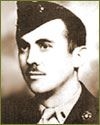 |
| William Hawkins (militaryconnections.com) |
What makes a true hero? Many people picture a hero as someone who changes lives and circumstances for the better, even at the expense of their own well-being. However, the best heroes go beyond this simple definition, because they make the ultimate sacrifice for others by laying down their lives. I chose William Hawkins as my hero, because he gallantly and selflessly laid down his life in WWII, not for himself, but for his fellow solders and country. Not only do I want to commemorate him but also the other hundred of thousands of American soldiers who paid the ultimate price for our freedom.
Because of William Hawkins’ sacrifice, valiant accomplishments, and of the inspiring effects of his actions, the U.S. won a vital victory against Japan in the Pacific. Born on April 19, 1914, in Fort Scott Kansas, Hawkins moved at an early age and spent most of his childhood in El Paseo, Texas, where he attended high school and college. Initially opposed to the war, Hawkins joined the Marines after Pearl Harbor to serve his country. By 1943 Hawkins had achieved the rank First Lieutenant, and on November 20th of that same year led the 2nd Scout-Sniper Platoon onto the small Pacific island of Betio. 4,800 elite Japanese fighters guarded the island, and in what became know as the Battle of Tarawa, 5,800 men died. The U.S. also had an extremely high casualty rate of 40%. But the ominous island did not daunt Hawkins.
As the first one to jump off the landing crafts that approached the beach and into the shallows of the island, Hawkins faced a 50/50 chance of surviving the onslaught of the Japanese bullets and shells. Miraculously, in the face of such fire, Hawkins managed to clear a pier of enemy snipers and so saved many other marines who approached the beaches. After surviving a bitter night of fighting, Hawkins led an assault with his platoon on the Japanese positions. This assault would determine the outcome of the battle. Moving seventy-five yards ahead of his men, Hawkins literally took on the enemy by himself, and destroyed a pillbox with five machine-guns in it. However, in the process of doing so shrapnel severely injured his chest. Instead of turning back to nurse his wound, which would have earned him a purple heart, Hawkins kept going, knowing that to protect his country and his troops he needed to do even more damage to the Japanese. Facing certain death, Hawkins went on to destroy three more such pillboxes one after another before the Japanese finally silenced him.
Because of Hawkins’ courageous and inspiring actions numerous lives were saved and the momentum of the battle swung in favor of the U.S. Due to his vital role in the battle and his sacrifice, Hawkins had a destroyer named after him and posthumously received the Medal of Honor. However, Hawkins never experienced any of this fame or honor; the only honor he experienced was serving and defending his country. In fact like the other thousand marines who died on Betio, Hawkins never expected anything in return for his actions.
Hawkins stands out among the many heroes in WWII who sacrificed their lives, because his extraordinary actions saved countless lives and influenced the outcome of a major battle.
William Hawkins could have lived a normal life like everyone else, but instead he chose to serve his country above his own desires. To lay one’s life down for another exhibits the greatest kind of love, and Hawkins did such a thing for his fellow soldiers and the U.S.A. I stand in awe of Hawkins and the many other soldiers because of their determination and disregard for their own lives in their desire to protect others. They are real heroes.
Page created on 2/28/2009 12:00:00 AM
Last edited 2/28/2009 12:00:00 AM
